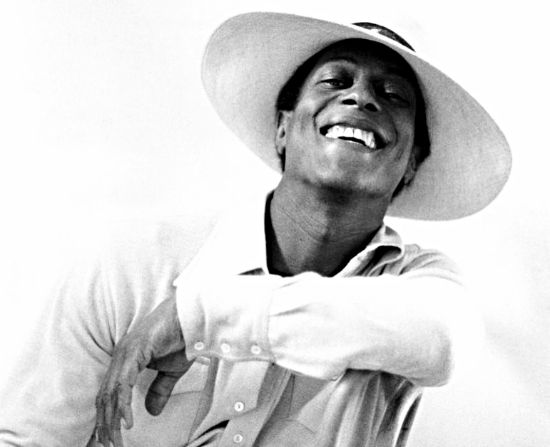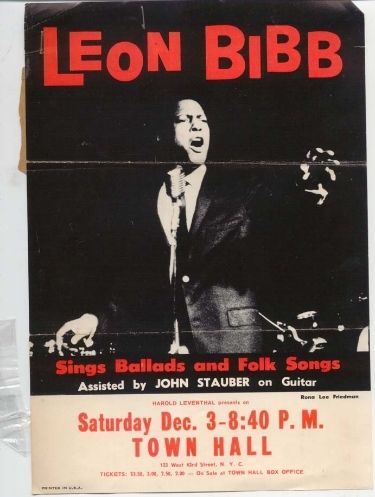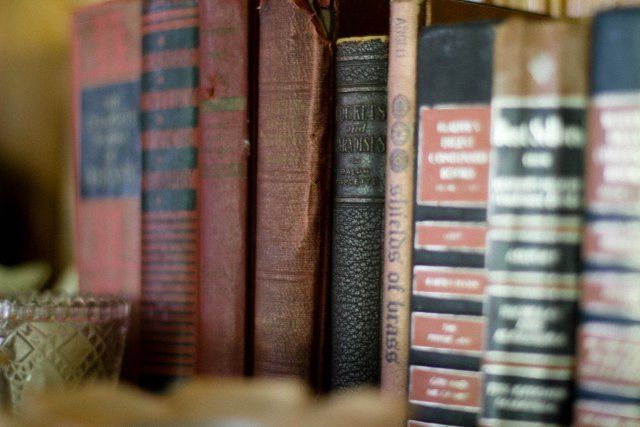
Leon Bibb. Born February 7, 1922 Died October 23, 2015
He sang, fought for freedom, and was blacklisted. RIP Leon Bibb.
Commentary by Black Kos Editor Denise Oliver-Velez
Some of you are too young to have lived through parts of the civil rights movement that included singers and musicians who used their voices and instruments to advance the struggle for racial justice. They are often referred to as "folk singers." Some of those names, like Pete Seeger's may be familiar to you, and others not.
I was blessed to grow up with parents who surrounded me with political activists. Among those activists were actors and musicians. When we moved to Hollis, Queens NYC when I was going into the 5th grade, a few blocks away from us was the home of friends of my parents—Leon Bibb, his wife and children. I got to spend a lot of time in and out of that home—the Bibbs had twins, Eric and Dorie, four years younger than I was and a younger daughter Amy. Through their doors would come Paul Robeson (Eric's godfather), Theodore Bikel, Peter, Paul and Mary, and numerous other performing artists, including Leon's brother-in-law pianist and jazz composer John Lewis.
I have to thank Leon's influence for exposing me to folk music, black folks songs, as well as to white leftist singers whose music helped shape my world.
Though he has been gone from this country since 1969 when he left the U.S. for Canada, his music and the memories of my young adulthood are with me still. I only got to see him once during the intervening years. He is gone, but his music lives on.
The New York Times just posted a lengthy obituary.
Leon Bibb, Actor, Folk Singer and Civil Rights Activist, Dies at 93
Leon Bibb, an actor turned folk singer whose powerful, elegant baritone voice made him a prominent figure in the folk-music revival and a stirring performer at the landmark civil rights demonstrations of the 1960s, including the third march from Selma to Montgomery, Ala., in 1965, died on Friday in Vancouver, British Columbia. He was 93.
...
It was the dearth of parts for black actors that motivated Mr. Bibb to remold himself as a folk singer in the mid-1950s, drawing on the spirituals that one of his aunts had sung to him as a child in Louisville, Ky. Albums like “Leon Bibb Sings Folk Songs,” released by the Vanguard label in 1959, and frequent performances on the television show “Hootenanny” made him one of the more prominent folk singers of the era. A regular at clubs like the Bitter End and the Village Gate in New York and the hungry i in San Francisco, he sang at the first Newport Folk Festival in 1959 and reached a broad television audience that same year when he sang “Sinner Man,” one of his signature songs, on “The Ed Sullivan Show.”
Mr. Bibb became involved in the civil rights movement early on, taking part in voter-registration drives in the South and performing at the 1963 March on Washington. In 1965 he performed in front of the statehouse in Montgomery with Joan Baez, Oscar Brand and Harry Belafonte, whom he had known since their acting days at the American Negro Theater in Harlem. “He was really committed to the cause of civil rights, and he was hugely inspiring,” Mr. Belafonte said in a telephone interview. “Between him and Mahalia Jackson, we had all the music we needed for the movement.”
Leon Bibb - Rocks & Gravel 1963 from HOOTENANNY
Published on May 24, 2014
Bibb was born in Louisville, Kentucky and was one of the performers at the first Newport Folk Festival in 1959. He also had his own NBC television talk show. During the late-1950s and early-1960s, Bibb was one of a number of American entertainers, such as his good friend Paul Robeson, who were blacklisted for alleged ties to left-wing groups and causes.
...
He is the father of the Helsinki, Finland based acoustic blues singer/songwriter Eric Bibb.
In 2009, he was made a Member of the Order of British Columbia. At the time of receiving this honor, Bibb was still an active performer. Leon Bibb made an impressive debut on Columbia Records in 1962 with the album "Leon Bibb Sings". This song "Dance Boatman" is taken from that album.
Leon Bibb receiving an Honorary Degree at UBC Vancouver 2011. He sings "Motherless Child," and talks about growing up in racist, segregated Louisville Kentucky.
"Look Over Yonder" Recorded live at St. Andrew's Wesley Church on Feb. 1, 2013 in HD (1080p on XA10).
This is a very special (impromptu) moment during an amazing concert where 90yr old Leon Bibb is moved by the moment to go off program and offer a song directly from his heart!
In my album of memorabilia, I still have the poster from Leon's Town Hall Concert

Leon was part of the "Isn't This a Time! A Tribute Concert for Harold Leventhal", which included Theodore Bikel, Erik Darling, Ronnie Gilbert, Arlo Guthrie, Fred Hellerman, Peter Paul & Mary and Pete Seeger. Harold Leventhal" was the noted leftist folk music promoter, known as "The Fifth Weaver".
Last year, Leon was working with composer Bill Sample on "Like a River - Leon Bibb Songbook and Recording Project"
Leon's son Eric Bibb has carried on the music tradition. They did a wonderful album together "A Family Affair."
The chariot has carried Leon home...and the music continues.
~~~~~~~~~~~~~~~~~~~~~~~~~~~~~~~~~~~~~~~~~~~~~~~~~~~~~
News by dopper0189, Black Kos Managing Editor
~~~~~~~~~~~~~~~~~~~~~~~~~~~~~~~~~~~~~~~~~~~~~~~~~~~~~

~~~~~~~~~~~~~~~~~~~~~~~~~~~~~~~~~~~~~~~~~~~~~~~~~~~~~
A troubled country has the chance to take a step forward. The Economist: No bums to throw out.
~~~~~~~~~~~~~~~~~~~~~~~~~~~~~~~~~~~~~~~~~~~~~~~~~~~~~
For the capital of a country where recent election turnouts have been low, Port-au-Prince does not lack for political advertising. Lampposts, electricity poles, even the lintels of lottery shops are plastered with toothy photos of the 53 candidates who are competing to be Haiti’s president in elections that begin on October 25th. Hundreds more are vying for parliamentary and municipal seats.
Though teeming with would-be presidents, Haiti barely has any elected officials. Just 11 are in office in the entire country: the current president, Michel Martelly, and ten senators. Elections were delayed twice—in 2011 and 2013—and parliament was dissolved early this year, leaving Mr Martelly, who cannot run again, to govern by decree. This month’s vote is thus a step towards restoring a functioning elected government.
Whoever leads it will face huge challenges. More than five years after an earthquake flattened much of the capital, Haiti is hobbled by corruption and political instability, and still vulnerable to disasters. The biggest shortcomings are in education, electricity and governance, says Gilles Damais of the Inter-American Development Bank. Money to fix them is scarce. Income from foreign donors dropped from 12% of GDP in 2010 to 7% last year. The government’s domestic revenues were a scant $1.1 billion, or 13% of GDP, in 2013.
Few people and firms pay taxes, and the state “struggles to provide services and appropriate regulation,” notes a recent report by the World Bank. The next president’s most urgent task will be to repair the broken social contract between citizens and the state, first of all by enforcing an anti-corruption law passed last year.
Of the dozens of contenders for the job, three stand a reasonable chance. Jude Célestin, a leftist, initially made it to the run-off in 2010 but withdrew after reports of widespread vote-rigging. Jovenel Moïse, a banana farmer, represents Mr Martelly’s right-of-centre party. Moïse Jean-Charles is a populist ex-senator, loudly critical of the government. If no one wins a majority, a run-off will take place in December.

~~~~~~~~~~~~~~~~~~~~~~~~~~~~~~~~~~~~~~~~~~~~~~~~~~~~
As black citizens take to American streets to rally against wholesale exoneration of cops who kill unarmed black men, its good to remember that the civil rights struggle struggle isn't just central only to the US. The Grio: How black student activists in South Africa turned #FeesMustFall into #FeesHaveFallen.
~~~~~~~~~~~~~~~~~~~~~~~~~~~~~~~~~~~~~~~~~~~~~~~~~~~
While many people believed that racial inequality was fixed in South Africa in 1994 after Nelson Mandela was elected and apartheid came to an end, the recent #FeesMustFall protest is providing scenes that are very reminiscent of the brutality black bodies were subjected to there just a few short decades ago.
In the last two weeks, students from universities all over South Africa have been clashing with school officials over proposed tuition increases. At UCT, (University of Cape Town) police donned in riot gear have been assaulting, arresting and terrorizing these kids and young adults with harsh violence.
The protests at UCT, which has a 49 percent black South-African enrollment, has resulted in many of the arrests and brutality being aimed squarely at the black students. Things got so bad that the black protesters had to ask their fellow white classmates to literally shield them with their white privilege, resulting in one of the most tragic and beautiful scenes we may see for the entire year.
As black students continue to have their lives and safety threatened by local police and the army, it’s beautiful to see allies being willing and able to come to their classmates’ rescue — yet it’s utterly disturbing that the violence these justice officers were willing to levy on people of color, they hesitated to do to white people. It continues the narrative that blackness of any age is a threat to national safety, while whiteness is granted the benefit of the doubt by being seen as innocent and deeply nuanced.

~~~~~~~~~~~~~~~~~~~~~~~~~~~~~~~~~~~~~~~~~~~~~~~~~~~~
Denis Sassou-Nguesso Congo-Brazzaville's president wants a third term. He will get it. The Economist: Another African president tries to change the rules.
~~~~~~~~~~~~~~~~~~~~~~~~~~~~~~~~~~~~~~~~~~~~~~~~~~~~
“CONGO is not a monarchy”, say the protesters; but it is looking a bit like one. The last few days have been gloomy for pro-democracy campaigners in Congo-Brazzaville, the small neighbour of the gigantic Democratic Republic of Congo. Its president, Denis Sassou-Nguesso, called a constitutional referendum for October 25th that would change the rules to allow him a third term; he is also currently barred on account of his age. In the run-up, opposition groups have mobilised in large numbers, staging demonstrations in Brazzaville, the capital, and Pointe Noire, the second biggest city. On social media, the phrase “Sassoufit”—a pun on the French for “that’s enough”—went viral, prompting the reply “Sassoui” from government supporters. On the streets young men burnt vehicles and built barricades in response to calls from opposition leaders for a campaign of civil disobedience across the country. The result was at least four deaths, as police opened fire on protesters, and some of the worst violence seen on Congolese streets since the end of the civil war in the early 2000s.
An earlier demonstration against Mr Sassou-Nguesso’s so-called “constitutional coup” on September 27th, attracted tens of thousands and was, say observers, the biggest anti-government protest since those that helped bring an end to Mr Sassou-Nguesso’s first period in office in 1992. Comparisons have been made with similar uprisings across Africa over the past year, such as the one that dislodged Burkina Faso’s former president, Blaise Compaoré, after 27 years in power last October. Mr Compaoré was attempting the same manoeuvre as his Congolese peer.
But a similarly successful uprising is much less likely in Congo-Brazzaville. On October 10th, supporters of the regime marched in favour of the constitutional changes, in larger numbers than seen at anti-government protests—although the opposition claimed that many were paid by the regime to attend. Mr Sassou-Nguesso, who has ruled Congo for more than 30 of the last 36 years, has civil society firmly under his thumb, and maintains a repressive, and effective, state apparatus. Government forces have pushed demonstrators back with tear gas and live ammunition. Communications—including texts, the internet and Radio France International—were cut, and public gatherings banned. Activists were detained and several were reported missing. In Burkina Faso the army was, largely, on the side of civilians: in Congo, the heads of all the major branches of the security and intelligence services are closely allied with the president, says Jennifer Dunham of Freedom House, an NGO. The result is a jittery public, wary of marching against a regime notorious for its violent past, and fearful of a slide back into civil war.

~~~~~~~~~~~~~~~~~~~~~~~~~~~~~~~~~~~~~~~~~~~~~~~~~~~~~

~~~~~~~~~~~~~~~~~~~~~~~~~~~~~~~~~~~~~~~~~~~~~~~~~~~~~
The New Jersey governor and low polling Republican Presidential candidate "tries on some crazy". The Guardian: Chris Christie says Black Lives Matter is calling for the 'murder of police'.
~~~~~~~~~~~~~~~~~~~~~~~~~~~~~~~~~~~~~~~~~~~~~~~~~~~~~
The Republican presidential candidate Chris Christie said on Sunday the Black Lives Matter protest movement was creating an environment that could put police officers at risk.
Speaking on CBS, he said: “I don’t believe that movement should be justified when they are calling for the murder of police officers.”
He also accused President Obama of supporting the movement and encouraging “lawlessness” while not backing up law enforcement.
Protests under the Black Lives Matter banner have coalesced around a number of deaths of African American people, most often unarmed, at the hands of police officers.
~~~~~~~~~~~~~~~~~~~~~~~~~~~~~~~~~~~~~~~~~~~~~~~~~~~
New York Times: University of Mississippi Lowers State Flag With Confederate Symbol.
~~~~~~~~~~~~~~~~~~~~~~~~~~~~~~~~~~~~~~~~~~~~~~~~~~
The University of Mississippi lowered the state flag, which features the Confederate battle emblem, from a prominent place on campus early Monday, responding to growing calls from student leaders for its removal.
Without fanfare, police officers furled the flag in a quiet end to a contentious campus debate, which has mirrored disputes over the flag throughout the South.
“The University of Mississippi community came to the realization years ago that the Confederate battle flag did not represent many of our core values, such as civility and respect for others,” Morris Stocks, the university’s interim chancellor, said in a statement. “Since that time, we have become a stronger and better university. We join other leaders in our state who are calling for a change in the state flag.”
The school’s N.A.A.C.P. chapter held a rally on Oct. 16, and the student government voted last week, 33 to 15 with one abstention, to request that the university remove the flag. Other campus organizations, including the faculty senate and the Graduate Student Council, joined the call within days.
Like several states in the South, Mississippi has been wrestling over its identification with the Confederate symbol, which was added to its state flag in 1894. Some state leaders condemned the university’s move.
~~~~~~~~~~~~~~~~~~~~~~~~~~~~~~~~~~~~~~~~~~~~~~~~~~~~~

~~~~~~~~~~~~~~~~~~~~~~~~~~~~~~~~~~~~~~~~~~~~~~~~~~~~~
Alabama.com: Justice Department: We will sue Alabama if it doesn't comply with voting law.
~~~~~~~~~~~~~~~~~~~~~~~~~~~~~~~~~~~~~~~~~~~~~~~~~~~~~
The U.S. Department of Justice in September sent a letter to Alabama Attorney General Luther Strange, warning that the state has failed to comply with the National Voter Registration Act – a two-decades-old law designed to make registering to vote easier -- and will be sued by the federal government.
Vanita Gupta, principal deputy assistant attorney general, told Strange she has authorized a lawsuit because Alabama did not implement requirements of the 1993 law – known as the Motor Voter Act. The act was meant to allow people to easily register to vote at the same time they get or renew driver licenses, or when they visit offices that provide public assistance.
"Our investigation indicates widespread noncompliance with Section 5 in Alabama," Gupta wrote. "Throughout the state, it appears that applications for an Alabama driver's license or a non-driver identification card do not serve as applications for voter registration with respect to elections for federal office, and that change of address submissions for driver license purposes do not serve as notification of a change of address for voter registration purposes."
Section 5 requires both those things.
~~~~~~~~~~~~~~~~~~~~~~~~~~~~~~~~~~~~~~~~~~~~~~~~~~~~~~~~~~
Voices and Soul

by Justice Putnam
Black Kos Poetry Editor
My fifteen year old grandson is as precocious as his father and his grandfather were at his age. He is a sponge for knowledge and is always reading. I found myself reprimanding him recently, the way I reprimanded his father and I was reprimanded by mine,
"I don't care how late you read, and you really should get some rest, but if you're going to read at 10 at night, turn on more light!"
When I was several years younger than him, we had to get up at 4:30 in the morning to do farm/ranch chores before we went to school, so I had a 9:30 p.m. bedtime with a 10 p.m. curfew on reading. I was too often caught and scolded for using my official army green, right angle Boy Scout flashlight while reading under the covers of my bed after the "curfew," sometimes as late as midnight.
My grandson has been showing an interest in the Civil Rights and Anti War movement of the 60's and early 70's. His father has regaled him with some stories of my family's involvement, so when I visited recently, I brought some photos and news clippings from marches, speeches, gatherings and events my family or I had participated in. I want him to know and also my 10 year old and 6 year old granddaughters to know, that the family reunions that include haitians and irish, latins and romas, chippewas and jews, czechs and cajuns, greeks and nigerians, and yes, gays and celibates as well, was peculiar to our family 50 years ago and not the norm as it seems to them now. I want them to know how much of a struggle it was to simply get a glass of water or use a bathroom if they were not of the correct hue. I want them to know that the simple act of holding hands might have jeopardized their lives in certain parts of this country. Each of us have the artifacts and history that records that struggle and change, from the stories we tell our children or grandchildren as they sit rapt at our knee, to the explanation behind a family photograph at the beach.
recycling
it's your 1st year of college & you should be missing
home by now but mostly you don't. you read the
Chicago newspapers & call family on Sundays.
you pick up going to church at a place adjacent to the projects.
you're not from the projects & the ones in Chicago seem worse
but there's comfort in being around plainspoken folk.
the church folk feed you & also cook you food.
you take African American studies classes & sleep
through Spanish & write poems at night. you
read the newspaper. you consider pledging a fraternity.
you go to parties to watch people. you don't miss home.
you call your ex girl a lot. you imagine her face across
the phone line. you stare at the scar
on her chin. it is shiny & smooth. you read
the newspaper. you text new girls mostly. you invite
them to play cards & bet clothes or take them to dinner
on your birthday so you don't spend it alone
or you share their extra-long twin beds or you just text them.
it's your 1st year of college & your nephew is tiny
& your niece is young enough to be happy & the world
is new & you are not going home for Thanksgiving.
you are in the South at a new friend's house.
you go to church with his family & to his old high school's
basketball game & to his malls & to his grandmother's house.
you did not make your team past 9th grade & never went to malls
much. your grandmother had been dead for 2 years now.
you read the newspaper. his family are nice people.
you do not miss home. you go back to school. you stop talking
to your ex girl. she has a new guy. you do not miss home.
you write poems. you read the newspaper. there are still more
kids dying. your 1st year of college & you should be missing
but you're still here. you write papers about black people
& voting & violence & families & that is the same
paper. you don't read the newspaper. you have finals to finish.
you go to church on Sunday with your new friend & you
talk to new girls & consider pledging. you have heard
the fraternities will haze you. you have heard about beating
but you are not from the projects & you are not in Chicago.
you stop reading the newspaper. you decide to kiss a girl
& mean it. you decide to pledge a fraternity. you should
have more information about the newspaper. & the girl.
& the fraternity. you should call home more. you don't
read the newspapers or call. you are not from the projects or
Chicago. you do not miss home. or your ex girl.
or your newspaper. there are still more kids dying. you
convince your new friend to pledge the fraternity.
he worries about the hazing, the beatings.
you tell him this is an opportunity. don't miss it.
-- Nate Marshall
"recycling"
~~~~~~~~~~~~~~~~~~~~~~~~~~~~~~~~~~~~~~~~~~~~~~~~~~~~~~~~~~
Welcome to the Black Kos Community Front Porch!
Pull up a chair and sit down a while and enjoy the company.



